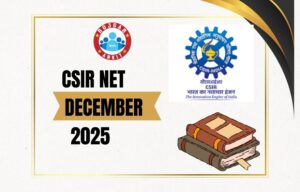Introduction
The NTA CSIR-UGC NET (Council of Scientific and Industrial Research – University Grants Commission National Eligibility Test) is a national-level examination conducted by the National Testing Agency (NTA) in India. It aims to determine the eligibility of candidates for the award of Junior Research Fellowship (JRF) and for appointment as Assistant Professor in Indian universities and colleges. The exam is held twice a year in various subjects under five major streams—Chemical Sciences, Earth Sciences, Life Sciences, Mathematical Sciences, and Physical Sciences.

It assesses a candidate’s research aptitude, subject knowledge, and analytical skills. Qualifying the CSIR-UGC NET opens opportunities for pursuing a Ph.D., engaging in advanced research, and starting an academic career in higher education institutions. It is considered one of the most prestigious exams for science postgraduates aspiring to contribute to research and teaching in India’s scientific community.
Difference Between NTA CSIR UGC NET and UGC NET
| Point | CSIR UGC NET | UGC NET (General) |
| Conducted by | NTA (on behalf of CSIR and UGC) | NTA (on behalf of UGC) |
| Fields Covered | Sciences: Chemical, Earth, Life, Mathematical, Physical | Humanities, Social Sciences, Commerce, Management, others |
| Frequency | Twice a year (June & December cycles) | Twice a year (usually June & December) |
| Exam Pattern | One Paper, 3 sections (A, B, C), Subject-specific | Two Papers (I: General, II: Subject-specific) |
| Eligibility | Master’s or 4-year Bachelor’s in Science with required marks | Master’s degree in any recognized program with required marks |
| For Posts | JRF/Assistant Professor in Sciences | JRF/Assistant Professor in Humanities, social sciences etc. |
| Syllabus | Science-oriented and subject-specific | General Paper I + Subject Paper II |
| Physical Test | No | No |
Eligibility Determination
| Qualified for | JRF | Assistant Professor | Ph.D. admission |
| Category-1 Award of JRF and appointment as Assistant Professor | Yes | Yes | Yes |
| Category-2 Appointment as Assistant Professor and admission to Ph.D. | No | Yes | Yes |
| Category-3 Admission to Ph.D. only | No | No | Yes |
Pattern of Question Papers
| Subject | Part | Total questions | Max No of Questions to attempt | Marks for each correct answer | Marks for each incorrect answer (Negative Marking) |
| CHEMICAL SCIENCES (701) | PART A | 20 | 15 | 2 | 0.5 (25%) |
| PART B | 40 | 35 | 2 | 0.5 (25%) | |
| PART C | 60 | 25 | 4 | 1 (25%) | |
| TOTAL | 120 | 75 | 200 (Max Marks) | – | |
| EARTH, ATMOSPHERIC, OCEAN AND PLANETARY SCIENCES (702) | PART A | 20 | 15 | 2 | 0.5 (25%) |
| PART B | 50 | 35 | 2 | 0.5 (25%) | |
| PART C | 80 | 25 | 4 | 1.32 (33%) | |
| TOTAL | 150 | 75 | 200 (Max Marks) | – | |
| LIFE SCIENCES (703) | PART A | 20 | 15 | 2 | 0.5 (25%) |
| PART B | 50 | 35 | 2 | 0.5 (25%) | |
| PART C | 75 | 25 | 4 | 1 (25%) | |
| TOTAL | 145 | 75 | 200 (Max Marks) | – | |
| MATHEMATICAL SCIENCES (704) | PART A | 20 | 15 | 2 | 0.5 (25%) |
| PART B | 40 | 25 | 3 | 0.75 (25%) | |
| PART C | 60 | 20 | 4.75 | 0 (No negative marking) | |
| TOTAL | 120 | 60 | 200 (Max Marks) | – | |
| PHYSICAL SCIENCES (705) | PART A | 20 | 15 | 2 | 0.5 (25%) |
| PART B | 25 | 20 | 3.5 | 0.875 (25%) | |
| PART C | 30 | 20 | 5 | 1.25 (25%) | |
| TOTAL | 75 | 55 | 200 (Max Marks) | – |
